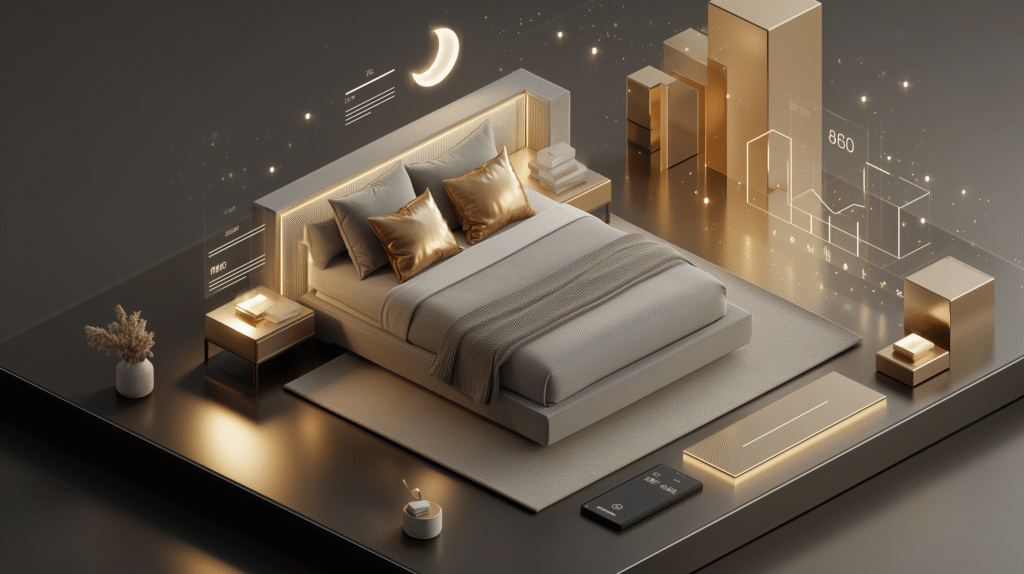In a world where technology increasingly touches every aspect of our lives, it’s no surprise that artificial intelligence (AI) has begun to make a significant impact on our health and wellness routines. One area that has seen promising developments thanks to AI is sleep improvement. Given the crucial role of sleep in overall health, emotional well-being, and cognitive function, it’s worth exploring how AI can play a part in enhancing our sleep patterns.
Understanding the Role of AI in Sleep
Before diving into the specifics, it’s important to understand what we mean by AI, especially in the context of health and wellness. AI refers to the simulation of human intelligence in machines that are programmed to think like humans and mimic their actions. In the realm of health, AI technologies can analyze data, recognize patterns, and make decisions with minimal human intervention.
How AI Technologies Are Applied to Sleep
AI can be utilized in various ways to improve sleep quality, from personal sleep tracking devices to sophisticated machine learning systems that analyze sleep-related data. These technologies not only help individuals understand their sleep patterns but also offer personalized recommendations to enhance sleep quality.
AI-Driven Tools for Sleep Improvement
The market is teeming with AI-driven tools designed to help users sleep better. Let’s explore some of the most innovative and effective ones available today:
Smart Sleep Trackers
Wearable devices like Fitbit and Withings use AI to monitor sleep stages, heart rate, and breathing. These devices provide insights into your sleep patterns and offer suggestions to improve sleep quality over time. By understanding the nuances of different sleep phases, users can adjust their habits to foster better sleep.
AI-Powered Sleep Apps
Applications such as Sleep Cycle and Pzizz utilize AI to analyze your sleep and provide interventions. For instance, Sleep Cycle analyzes your movements and sound patterns using AI to determine the optimal time to wake you up within a set window, enhancing your morning alertness and overall sleep quality. Pzizz uses AI to generate soothing soundtracks that can help you fall asleep faster and wake up refreshed.
Smart Beds and Mattresses
Innovative companies like Eight Sleep offer smart mattresses that use AI to regulate the temperature, track sleep phases, and even adjust firmness based on the sleeper’s habits and preferences. This personalization helps in creating an optimal sleep environment tailored to individual needs.
The Science Behind AI and Sleep Enhancement
AI’s capability to enhance sleep is backed by various scientific studies and research. AI systems are incredibly good at processing large amounts of data quickly and accurately, which is crucial in identifying the often subtle patterns and issues in sleep that might be missed by humans.
Machine Learning and Sleep Data
Machine learning, a subset of AI, is particularly adept at analyzing complex sleep data. Researchers use machine learning algorithms to study sleep patterns and predict sleep disorders such as sleep apnea. For example, a study published in the Journal of Clinical Sleep Medicine explored the use of AI in diagnosing sleep apnea accurately and swiftly, potentially speeding up the initiation of appropriate treatments.
Personalized Sleep Recommendations
AI not only helps in analyzing sleep data but also in creating personalized sleep improvement plans. By understanding individual sleep patterns and lifestyle factors, AI-driven apps and devices can suggest the best times to sleep, ideal room temperatures, and even dietary recommendations that might improve sleep quality.
Considerations and Limitations
While AI offers impressive capabilities in sleep improvement, it’s important to remain aware of its limitations and ethical considerations. For instance, the accuracy of AI recommendations can vary based on the quality and quantity of the data it has been trained on. Users should also be mindful of privacy concerns when it comes to sharing personal health data with AI systems.
Ensuring Data Privacy
When using AI tools, it’s crucial to ensure that your data is handled securely and with respect for your privacy. Opt for services that transparently explain how your data is used and stored. Check for compliance with regulations such as GDPR or HIPAA, which provide guidelines on the handling of personal data.
User Responsibility and AI Interaction
It’s also essential for users to understand that while AI can provide helpful insights and suggestions, the ultimate responsibility for health and wellness choices rests with the individual. AI should be seen as a tool to aid, not replace, personal judgment and professional medical advice.
Conclusion
AI has the potential to revolutionize how we approach sleep improvement, offering personalized insights and solutions that were not possible before. As technology continues to advance, we can expect even more innovative AI tools to emerge, helping us understand and enhance our sleep in ways we’ve only just begun to explore. Embracing AI in our sleep routines could be a significant step toward better health and improved quality of life.
For further information on AI innovations in health, consider visiting leading health technology platforms such as Healthline or WebMD, which frequently feature articles and updates on the latest in health tech.

